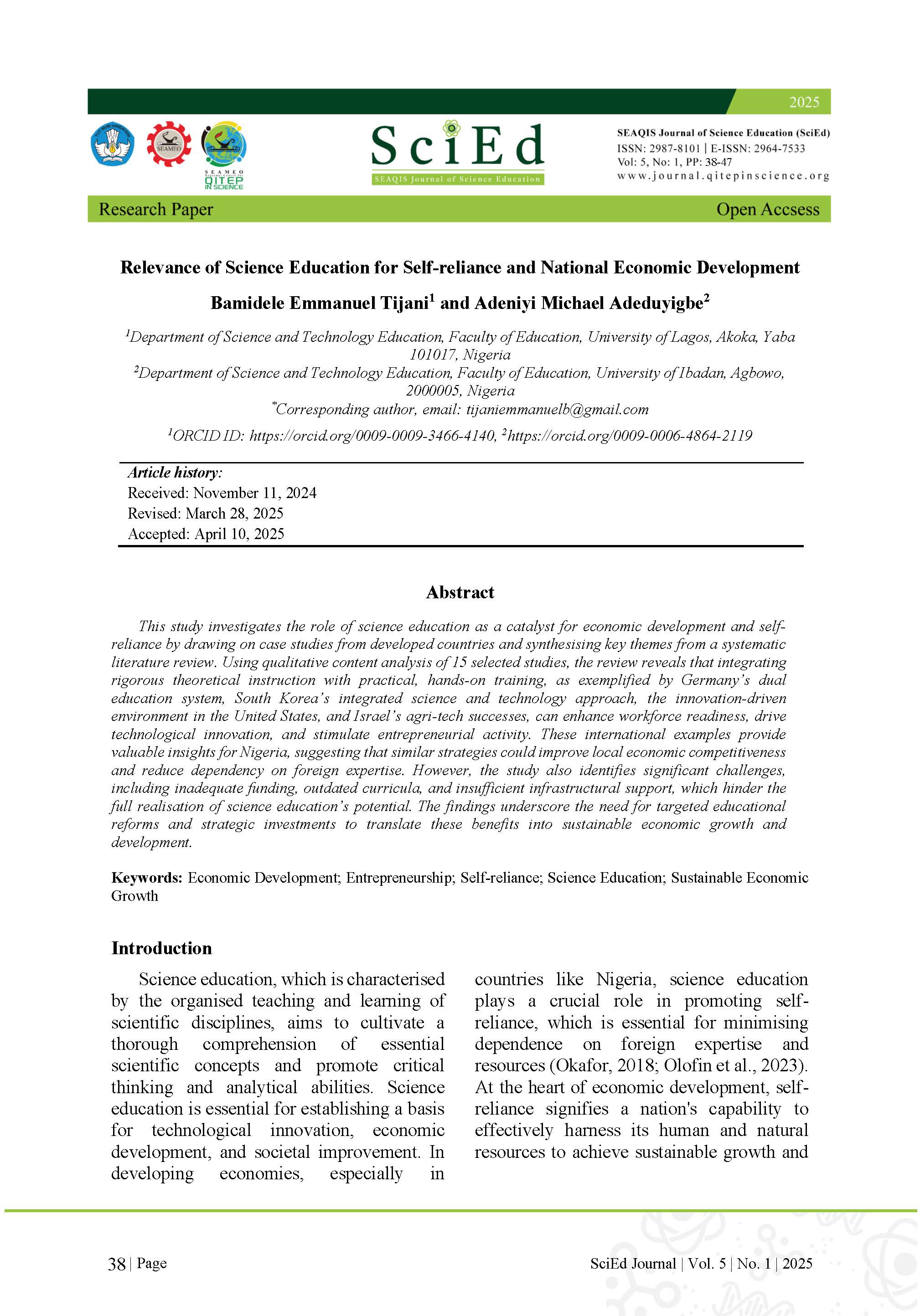Relevance of Science Education for Self-reliance and National Economic Development
DOI:
https://doi.org/10.58249/sjse.v5i01.165Keywords:
Economic Development, Entrepreneurship, Self-reliance, Science Education, Sustainable Economic GrowthAbstract
This study investigates the role of science education as a catalyst for economic development and self‐reliance by drawing on case studies from developed countries and synthesising key themes from a systematic literature review. Using qualitative content analysis of 15 selected studies, the review reveals that integrating rigorous theoretical instruction with practical, hands-on training, as exemplified by Germany’s dual education system, South Korea’s integrated science and technology approach, the innovation-driven environment in the United States, and Israel’s agri-tech successes, can enhance workforce readiness, drive technological innovation, and stimulate entrepreneurial activity. These international examples provide valuable insights for Nigeria, suggesting that similar strategies could improve local economic competitiveness and reduce dependency on foreign expertise. However, the study also identifies significant challenges, including inadequate funding, outdated curricula, and insufficient infrastructural support, which hinder the full realisation of science education’s potential. The findings underscore the need for targeted educational reforms and strategic investments to translate these benefits into sustainable economic growth and development.
References
Adeoye, M. A., Mahmud, M. A., Ehindero, R. E., Ajape, R. O., Yahaya, A. K., & Jolaoye, J. D. (2023). From flawed to Flourishing: Reshaping the Nigerian curriculum for sustainable national development. Journal of Education Action Research, 7(4), 621–627. https://doi.org/10.23887/jear.v7i4.67812
Adolphus, T. (2020). The role of science education in skills acquisition and youth empowerment in Nigeria. International Journal of Research Publications, 65(1), 9-18. https://doi.org/10.47119/ijrp1006511120201546
Aniashi, O., Okaba, A., Anake, U., & Akomaye, U. (2019). Classroom science with everyday life: A means for improving performance in sciences and national development in Nigeria. International Journal of Science and Technology Educational Research, 10(3), 25–29. https://doi.org/10.5897/ijster2019.0457
Ankeli, G. O. (2019). Acquisition of Entrepreneurial and Scientific Skills for Youth Self-Sustainability and Job Creation towards National Development in Nigeria. World Journal of Entrepreneurial Development Studies, 3(1), 24-31.
Baethge, M., & Wolter, A. (2015). The German skill formation model in transition: from dual system of VET to higher education? Journal for Labour Market Research, 48(2), 97–112. https://doi.org/10.1007/s12651-015-0181-x
Chinyere, A. P., & Ndirika, M. C. (2020). Promoting Innovation, creativity and entrepreneurship Skills in science Education Students: A Panacea for Employability. Journal of Education and Practice, 4(3), 44–55. https://doi.org/10.47941/jep.477
Enemuo, N. K., & Ozoemena, L. E. (2020). Repositioning of secondary education for economic empowerment through innovation, creativity and entrepreneurship skills in Nigeria. International Journal of Studies in Education, 16(2), 175-186. Retrieved from https://ijose.unn.edu.ng/wp-content/uploads/sites/224/2020/07/pp-175-186-Vol.16-No.-2.pdf
Fu, X., & Zhang, J. (2011). Technology transfer, indigenous innovation and leapfrogging in green technology: the solar-PV industry in China and India. Journal of Chinese Economic and Business Studies, 9(4), 329–347. https://doi.org/10.1080/14765284.2011.618590
Guennif, S., & Ramani, S. V. (2011). Explaining divergence in catching-up in pharma between India and Brazil using the NSI framework. Research Policy, 41(2), 430–441. https://doi.org/10.1016/j.respol.2011.09.005
Jakovljevic, M., Liu, Y., Cerda, A., Simonyan, M., Correia, T., Mariita, R. M., Kumara, A. S., Garcia, L., Krstic, K., Osabohien, R., Toan, T. K., Adhikari, C., Chuc, N. T. K., Khatri, R. B., Chattu, V. K., Wang, L., Wijeratne, T., Kouassi, E., Khan, H. N., & Varjacic, M. (2021). The Global South political economy of health financing and spending landscape – history and presence. Journal of Medical Economics, 24(sup1), 25–33. https://doi.org/10.1080/13696998.2021.2007691
Kim, E. (2017). Sociotechnical imaginaries and the globalization of converging Technology Policy: Technological Developmentalism in South Korea. Science as Culture, 27(2), 175–197. https://doi.org/10.1080/09505431.2017.1354844
Kutty, A. A., Abdella, G. M., Kucukvar, M., Onat, N. C., & Bulu, M. (2020). A system thinking approach for harmonizing smart and sustainable city initiatives with United Nations sustainable development goals. Sustainable Development, 28(5), 1347–1365. https://doi.org/10.1002/sd.2088
Lee, H., Ham, H., & Kwon, H. (2020). Research trends of integrative technology education in South Korea: a literature review of journal papers. International Journal of Technology and Design Education, 32(2), 791–804. https://doi.org/10.1007/s10798-020-09625-7
Lee, J. J., & Haupt, J. P. (2019). Winners and losers in US-China scientific research collaborations. Higher Education, 80(1), 57–74. https://doi.org/10.1007/s10734-019-00464-7
Li, L. (2017). China’s manufacturing locus in 2025: With a comparison of “Made-in-China 2025” and “Industry 4.0.” Technological Forecasting and Social Change, 135, 66–74. https://doi.org/10.1016/j.techfore.2017.05.028
Mbanefo, M. C., & Eboka, O. C. (2017). Acquisition of Innovative and Entrepreneurial Skills in Basic Science Education for Job Creation in Nigeria. Science Education International, 28(3), 207-213. https://doi.org/10.33828/sei.v28.i3.4
Musa, A., Victor, B., & Ali, H. (2016). Education, Science and Technology: a triadic process for promoting socio-economic skills in Nigeria. Issues in Scientific Research, 1(4), 52-60. https://doi.org/10.15739/isr.16.006
Nwafor, C. E., & Okoi, O. O. (2018). Science and Technical Education Beyond the Classroom: A Case Study of Mechanic Village, Abakaliki, Ebonyi State, Nigeria. Middle-East Journal of Scientific Research, 26(7), 688–697. https://doi.org/10.5829/idosi.mejsr.2018.688.697
Obori, I. A. O. (2012). Re-Engineering Science Education for Employment and Self-productivity in Nigeria. African Education Indices, 4(1), 119-128.
Okafor, C. F. (2018). Science education: A tool for skill acquisition and entrepreneurship development of Nigerian students. Nnadiebube Journal Education in Africa, 3(2), 19–38.
Olofin, S. O., Ogunjobi, A.O., Falemu, F.A., & Akinwumi, I. O. (2023). Science education as a tool for achieving socio-economic development in Nigeria. International Journal of Development and Economic Sustainability 11(4), 33-44. Retrieved from https://doi.org/10.37745/ijdes.13/vol11n43344
Onyebuchi, N. C., Unachukwu, C. C., & Osawaru, B. (2024). STEM education advancements in African contexts: A comprehensive review. World Journal of Advanced Research and Reviews, 21(1), 145–160. https://doi.org/10.30574/wjarr.2024.21.1.2719
Sen, S., Chakraborty, R., & De, B. (2011). Challenges and opportunities in the advancement of herbal medicine: India’s position and role in a global context. Journal of Herbal Medicine, 1(3–4), 67–75. https://doi.org/10.1016/j.hermed.2011.11.001
Shamsuddin, I. M., Arome, A. T., & Aminu, I. (2018). Entrepreneurship, Science and Technology Education for Self-Reliance and Economic Diversification. International Journal of Engineering Management, 2(1), 1-7. https://doi.org/10.11648/j.ijem.20180201.11
Solga, H., Protsch, P., Ebner, C., & Brzinsky-Fay, C. (2014). The German vocational education and training system: Its institutional configuration, strengths, and challenges. ECONSTOR. Retrieved March 27, 2025, from https://www.econstor.eu/handle/10419/104536
Umar, Y. (2019). STEM Education as a Catalyst for National Development: Problems and Prospects in Nigeria. Learning Science and Mathematics, 14, 48–59.
Urbanova, M. (2018). Japan’s Legacy of Technology in the Digital Era : A Mixed Methods Analysis of the Competitive Advantage of the IoT Sector in Japan. LUP Student Papers. http://lup.lub.lu.se/student-papers/record/8953276
Williamson, P. J., & Yin, E. (2014). Accelerated Innovation: the new challenge from China. MIT Sloan Management Review. Retrieved March 28, 2025, from https://sloanreview.mit.edu/article/accelerated-innovation-the-new-challenge-from-china/

Downloads
Published
Issue
Section
Citation Check
License
Copyright (c) 2025 SEAQIS Journal of Science Education

This work is licensed under a Creative Commons Attribution 4.0 International License.

This work is licensed under a Creative Commons Attribution 4.0 International License.














